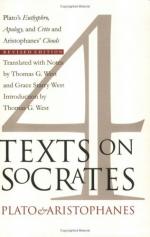
|
| Name: _________________________ | Period: ___________________ |
This test consists of 5 multiple choice questions, 5 short answer questions, and 10 short essay questions.
Multiple Choice Questions
1. At what point does Strepsiades stop speaking to Pheidippides?
(a) When Pheidippides enrolls with Socrates.
(b) When Pheidippides tries to trick Strepsiades' creditors.
(c) When Pheidippides reads a poem about incest.
(d) When Pheidippides threatens to beat up his own mother.
2. What is the correct chronology of Socratic dialogues?
(a) Apology, Euthyphro, Crito.
(b) Euthyphro, Apology, Crito.
(c) Apology, Crito, Euthyphro.
(d) Euthyphro, Crito, Apology.
3. In The Clouds, why does Socrates reject tradition?
(a) Because he believes he knows better.
(b) Because tradition has been full of injustice.
(c) Because Socrates doesn't know any better.
(d) Because it's the right thing to do.
4. Where does Crito take place?
(a) In Socrates' school.
(b) In Crito's study.
(c) In prison.
(d) At Plato's home.
5. Which side does Aristophanes take in the conflict with Socrates?
(a) His stance is impossible to determine.
(b) Athens' citizens.
(c) Plato.
(d) Socrates.
Short Answer Questions
1. What is the danger of disobeying an unjust law?
2. Who is the first person to accuse Socrates of corrupting the youth?
3. Which of the following is true about Socrates' possible disobeying of a law, according to Socrates in Crito?
4. Why is The Clouds so memorable today?
5. According to The Clouds, what force holds communities and families together?
Short Essay Questions
1. What does Aristophanes accuse Socrates of in The Clouds?
2. What reasons does Socrates give for deciding to remain in Athens, rather than escape with Crito?
3. How does Aristophanes' general attitude towards Socrates differ from that of Plato's?
4. What is the nature of Strepsiades' most pressing problem? What does he hope to learn from Socrates? What does Socrates in turn teach him?
5. Why did Socrates offer such a meek defense and go to prison and his death so willingly?
6. Given Crito's criticism of Socrates, what segment of society can Crito be said to represent?
7. According to Socrates, why must experts always be obeyed?
8. What gives law authority, according to Socrates?
9. How does Strepsiades react to Socrates' course of study in the Thinkery? How does Socrates in turn respond to Strepsiades?
10. What is Crito's opinion of Socrates, following his trial?
|
This section contains 856 words (approx. 3 pages at 300 words per page) |

|




